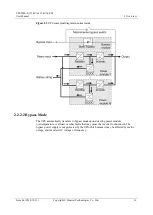
UPS5000-E-(25 kVA-125 kVA)-FM
User Manual
2 Overview
Issue 06 (2019-12-13)
Copyright © Huawei Technologies Co., Ltd.
30
The dry contact interface card takes effect only after it is set on the monitoring system. Set the
unused dry contact signal to the unused status.
Set the EPO port to NO or NC as required.
When multiple UPSs are paralleled, all dry contact signals to be used need to connect to each UPS.
Single cables require dual-insulated twisted cables. If the length of a power cable is within 25–50 m,
its cross-sectional area must be 0.5 mm
2
to 1.5 mm
2
.
Functions
The dry contact card allows the UPS to detect and manage the switch status of the battery
system (including the external battery switch) and implement remote emergency power-off
(EPO).
Specifications
Hot-swappable
0.5 U high
2.3.5.4 Monitoring interface card
The FE port resembles the RS485 port. Follow the silk screen when connecting
communications cables as, if the RS485 port is mistaken for the FE port during cable
connection, the WebUI cannot be connected. Conversely, if the FE port is mistaken for the
RS485 port during cable connection, RS485 communication fails.
Dry contact signals take effect after you set them. Disable unused dry contact signals on
the monitoring system.
In a parallel system, ensure that used dry contacts properly connect to each UPS.
The monitoring interface card provides external ports as well as monitoring and control
functions for the MDU. The ports include the ambient temperature and humidity sensor port,
iBattery port, FE port, battery temperature monitoring port, and network management port.
The MDU monitors the UPS, allows users to set parameters, delivers commands, reports
information, and displays the UPS key information and parameters on the LCD.
















































